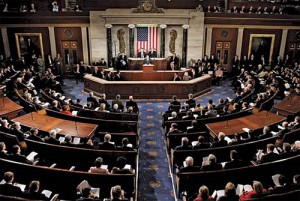Want to Bring Back Bipartisanship? Try Restoring Pork Barrel Spending

American politics are especially divisive at the moment, which is why the current Congress is one of the least productive in decades and struggles to get much of anything done. But just because things are especially partisan at the moment doesn’t mean that our national legislature shouldn’t be able to get big things done.
In the past, party leaders had various tools to ensure that on the big items of the day, members of Congress would fall in line. Before the decision in Citizens United v. Federal Election Commission and the rise of the outside spending by PACs and other groups, most members of Congress needed help from the national party in their re-election campaigns. The price for financial assistance was that these members of Congress would vote with the party on must-pass pieces of legislation, such as bills meant to fund the government and prevent shutdowns or legislation that helped support both farmers and people who needed government assistance in buying food for their families.
But with the rise of dark money, the influence of party leadership steadily declined, and members felt more comfortable bucking the party line. And a short while after Citizens United, congressional Republicans also decided to end the practice of allowing earmarks, also known as pork barrel spending. Earmarks are defined as “funds provided by the Congress for projects, programs, or grants where the purported congressional direction (whether in statutory text, report language, or other communication) circumvents otherwise applicable merit-based or competitive allocation processes, or specifies the location or recipient, or otherwise curtails the ability of the executive branch to manage its statutory and constitutional responsibilities pertaining to the funds allocation process.”
The move by Republicans to end earmarks was correctly lauded as a return to congressional transparency and fairness. After all, why would Americans support the allocation of funding that wasn’t merit based or subject to the competitive allocation process?
But things aren’t so simple. Earmarks had several disadvantages in that they made it easier for incumbents to stay in power by funneling money to their districts and fostered potential corruption in both Congress and in districts across the country. Conversely, they served as an effective tool to ensure that some of the rowdier members came to the table to compromise every once in a while.
Currently, there are many big issues that require either compromise or for one party to have an overwhelming congressional majority in order to enact legislation. Immigration reform, gun control, criminal justice reform, education reform, and many other large-scale issues remain untouched because there’s no foreseeable path by which legislation can be passed and signed into law.
With a reasonable but limited restoration of earmarks, and with an accompanying process to ensure that voters know just where and who the earmarks are going to without reading through reams of legislation, progress could be made on a host of issues and could lead to funding for much needed public works projects around the country. Members who are seemingly intractable on issues like gun control reform might find their position softening if in return they finally get much-needed funding for the restoration of bridges and roads within their district. Members who are reluctant to embrace education reform might find themselves more amenable to these changes if there is additional funding allocated for educational grants or services in their district.
To many, earmarks are merely a euphemism for graft, but so long as the funding is only going to reputable public projects in communities across the US and aren’t lining the pockets of allies of members of Congress, they have the potential to do a lot of good. It’s important to admit that restoring earmarks comes with a large amount of risk, but barring the overturn of Citizens United it could be the only solution to break through the partisan gridlock that is paralyzing our national legislature and preventing us from dealing with the problems that plague our society.
